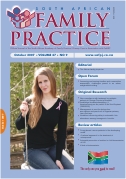Management of erectile dysfunction: perception and practices of Nigerian primary care clinicians
Keywords:
erectile dysfunction, sexual health, primary care clinicians, Nigeria
Abstract
Background Erectile dysfunction (ED) is a prevalent health problem in many societies, but the diagnosis is seldom documented in primary care. The objective of this study was to investigate the perception and practices of clinicians regarding the management of ED in primary care settings in Nigeria. Methods A self-administered semi-structured questionnaire was applied to a purposive sample of clinicians attending conferences/workshops organised by the Society of Family Physicians of Nigeria and Update Courses of the Faculties of Family Medicine of the National Postgraduate Medical College of Nigeria and the West African College of Physicians. Information was obtained on their professional characteristics, experiences with the management of ED and possible barriers to the effective management of ED. Results A total of 187 completed questionnaires were analysed. Most (87.2%) of the respondents were general practitioners, while the rest were specialists in various fields (excluding sexual health) who worked at the primary care level. One hundred and forty-seven respondents (76%) reported that ED was common in their clinical practice. Over half (56.2%) of the respondents ascribed a high priority to ED management in their day-to-day clinical practice, while 33.2% and 10.6% of them ascribed medium and low priority to ED management respectively. Although 80.8% of the respondents agreed that ED patients could benefit from orthodox treatments, only 18% of them had ever prescribed any medication for affected patients; most (82%) of them either counselled or referred ED patients to secondary or tertiary care level for further management. Most of the clinicians (62%) would not take a sexual history unless the patient brought it up. The reported barriers to the management of ED include lack of a standardised protocol (64.2%), inadequate experience in ED management (85.6%), preference of patients for native medication (42.3%), and the high cost of modern medication (48.1%). Conclusion The clinicians acknowledged the high prevalence of ED in the primary care setting and recognised that they had a role to play in managing affected patients. The identified barriers to the management of the condition point to the need for education of both clinicians and patients, as well as the provision of guidelines for the management of ED in primary care settings.
Published
2007-10-18
Section
Original Research
By submitting manuscripts to SAFP, authors of original articles are assigning copyright to the South African Academy of Family Physicians. Copyright of review articles are assigned to the Publisher, Medpharm Publications (Pty) Ltd, unless otherwise specified. Authors may use their own work after publication without written permission, provided they acknowledge the original source. Individuals and academic institutions may freely copy and distribute articles published in SAFP for educational and research purposes without obtaining permission.

